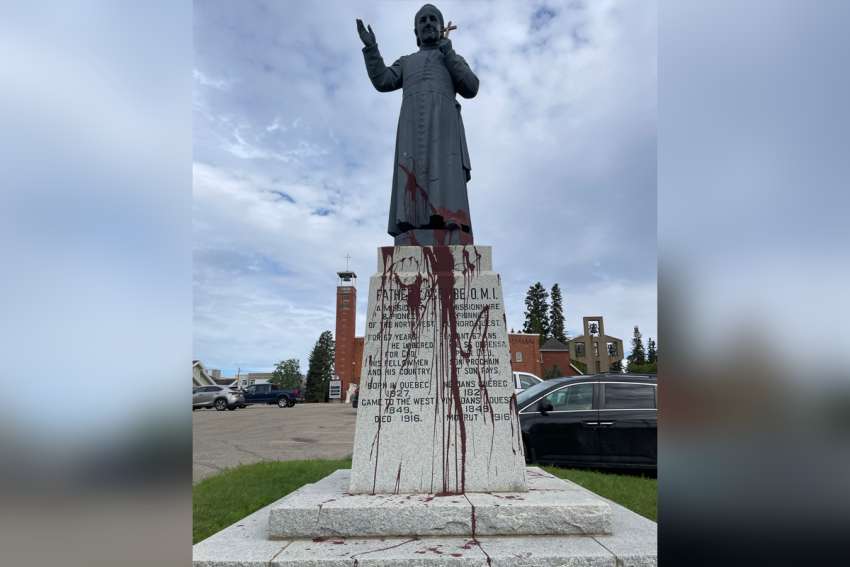“The Catholic Bishops of Canada adamantly object to all forms and expressions of acts of violence or vandalism against any faith community,” the bishops' conference said in a statement to The Catholic Register. "The Bishops appeal to the minds and hearts of the Catholic faithful, and all people of goodwill, to denounce all forms of extremism and violence against fellow human beings of all faith traditions.”
The St. Albert RCMP received a report that the Fr. Albert Lacombe statue at 7 Vital Ave. in the Edmonton suburb was smeared with red or brown paint splatter and handprints. The message “No Rest for the Wicked” was etched on the statue’s base. A security camera did not capture this crime.
Andrew Ehrkamp, the Archdiocese of Edmonton's communications lead, said, “Any time something like this happens, it’s distressing, especially for the parish community and clergy of St. Albert Parish.”
Ehrkamp added that the church hired a company to remove the paint damage from the statue, which memorializes the famed pioneer of the Missionary Oblates of Mary Immaculate.
Meanwhile, the RCMP has launched an investigation. Cpl. Morgan Kyle informed local media that her detachment had not identified any suspects, and she implored anyone with information or video footage to step forward. Police have not determined a motive for this act of vandalism, though it falls in line with a number of incidents since claims of mass graves were made by a Kamloops, B.C., First Nation three years ago.
St. Albert resident Vincent Fernmeyer speculated to the St. Albert Gazette that this vandalism might be linked to Lacombe’s historical role in the residential school system. Lacombe, a native of Saint-Sulpice, Que., was a crucial figure in establishing the schools, serving as the principal of St Joseph’s Industrial School in Foothills County (Dunbow) from 1884-85. He later served on the Northwest Territories’ board of education for six years.
Five days before the defacement in St. Albert, a University of Ottawa statue commemorating the late Oblate Fr. Joseph-Henri Tabaret was covered in red paint. The word “colonizer” was marked in black on the sidewalk underneath the statue, which graces the entryway of the Tabaret Hall administrative building.
No individual or group has been officially accused. Still, it was well documented that a pro-Palestinian encampment was established within steps of the shrine, honouring the founder and long-time rector of the higher education institute. Much of the rhetoric around its cause has centred on Israel being a "colonizer" state.
In its communication with the CCCB, the Register asked if the Canadian bishops would consider releasing a joint statement with their Indigenous partners that would denounce the vandalization of statues or houses of worship. In reply, the CCCB stated, “Indigenous, government and religious leaders have continually condemned these acts of violence and will continue working together to support meaningful healing and reconciliation.”
It has now been over three years since the unproven discovery of 215 unmarked graves via ground-penetrating radar near the former Kamloops Indian Residential School. Since that proclamation from the Tk’emlúps te Secwépemc (TteS) First Nation on May 27, 2021, over 100 Christian churches have been vandalized, marred by fire or burned to the ground.
Notably, the First Nation’s newest statement does not mention children. This year’s commemorative address notably alluded to “215 anomalies.” Such a linguistic concession could — and should, in the eyes of “mass graves” skeptics — intensify calls for an excavation to uncover the truth. While the TteS pivoted in its messaging, the British Columbia Assembly of First Nations Regional Chief Terry Teegee promulgated a new theory as to why no human remains are being uncovered in the vicinity of former residential schools.
An anonymous Calgary parishioner shared with the Register a letter he addressed to Bishop William McGrattan that denounced Teegee’s theory. He wrote “except for Kamloops, there have been excavations across Canada at many former IRS sites, and no remains have been found where knowledge-keepers said there would be.”
The Register sought comment from McGrattan about the letter. CCCB director of communications Maribel Mayorga wrote that “while it would not be appropriate (for McGrattan) to respond publicly to a letter from a private citizen,” a statement “can be attributed to him on some of the broader concerns.”
McGrattan stated: “The Canadian Bishops have apologized for the suffering experienced in Canada’s residential school system, for the failure to respect the rich history, traditions and wisdom of Indigenous peoples and for the grave abuses that were committed by some members of the Catholic community. We recognize that for many, the anger and trauma that was inflicted in this system persists to this day. We continue to focus on the important work of reconciliation, which includes making relevant records available so that Indigenous researchers have access to a more complete history of the residential school system.
“Our goal is to maintain a constructive dialogue with our Indigenous communities and we are grateful to those who have contributed to shared projects that support this work,” continued McGrattan. “This means a commitment to the truth and a desire to not promote divisiveness in the process of walking together.”


